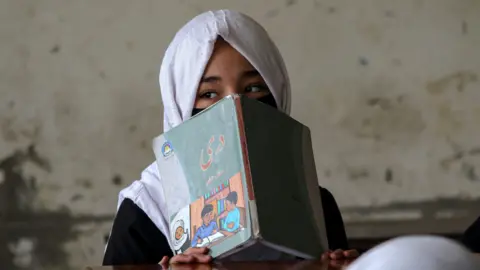 |
| Only girls under the age of 12 have been able to attend school since 2021 |
ICC Takes a Stand: Taliban Leaders Wanted for Crimes Against Afghan Women
In a landmark move, the International Criminal Court (ICC) has issued arrest warrants for two top Taliban leaders, accusing them of crimes against humanity for their treatment of women and girls in Afghanistan since seizing power in 2021.
The court named Haibatullah Akhundzada, the Taliban's Supreme Leader, and Abdul Hakim Haqqani, its Chief Justice, as responsible for gender-based persecution—a rare yet powerful charge reflecting the deteriorating situation under Taliban rule.
What Are the Charges?
Since the Taliban's takeover, girls over the age of 12 have been banned from schools, women have been excluded from most jobs, and strict limitations have been placed on their mobility and visibility in public life. The ICC states that these actions constitute gender-based persecution, a crime under international law.
The court noted that while some policies applied broadly, women and girls were targeted specifically because of their gender, systematically stripped of fundamental rights such as education, employment, and freedom of expression.
“These are not cultural customs—they are human rights violations,” said ICC Prosecutor Karim Khan.
Taliban Responds with Denial
Unsurprisingly, the Taliban rejected the ICC’s ruling. In a statement, it labeled the arrest warrants a “clear act of hostility” and an “insult to Islamic beliefs.” The regime maintains that its treatment of women aligns with its interpretation of Islamic law and Afghan tradition, a position widely rejected by international human rights groups.
Global Reactions and Challenges Ahead
Human Rights Watch welcomed the ICC’s action but urged that justice be extended to other victims—including those affected by the Islamic State-Khorasan Province, the former Afghan government, and even foreign forces such as the U.S. military.
While symbolic and important, the ICC lacks its own enforcement mechanism, meaning it relies on member states to execute arrest warrants. With the Taliban not recognizing the court and currently in full control of Afghanistan, the arrests are unlikely to be carried out soon.
Why This Matters
This development marks a significant attempt to hold authoritarian regimes accountable for systemic human rights abuses. The situation in Afghanistan has become a textbook example of gender apartheid, as previously described by the United Nations.
If left unchallenged, such impunity risks becoming normalized in other parts of the world. The ICC’s decision underscores the need for global solidarity and pressure to restore rights to Afghan women and girls.
Final Thoughts
The international community has long debated how best to respond to the Taliban’s crackdown on women. With these arrest warrants, the ICC sends a message: no leader is above international law when it comes to crimes against humanity.
What do you think? Will these warrants lead to real accountability—or will justice remain out of reach for Afghan women?


Post a Comment
0Comments